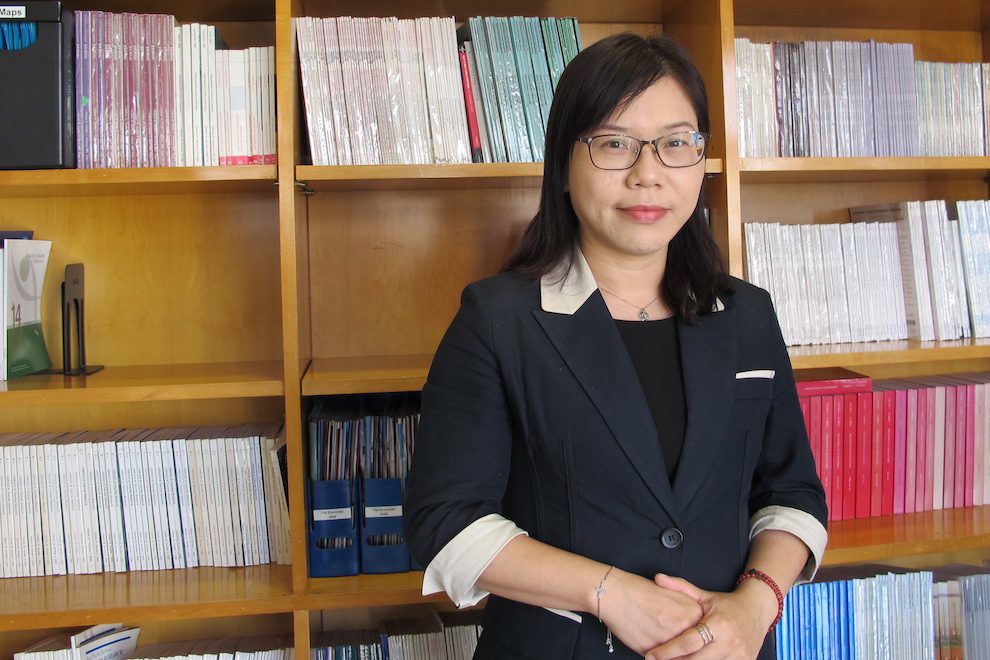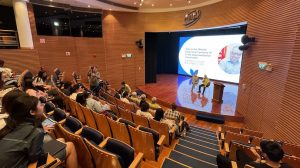An ongoing priority for IFTM’s management for several years has been the development of a “smart campus” powered by the latest technology and software solutions. One example of these efforts is the recently-established IFTM Heritage Documentation Lab, containing interactive displays and top-notch equipment, on the Taipa campus. The specialist IFTM Retail Lab is to follow, all in order to create new learning experiences for students.
Behind the Institute’s push for a smart campus is the IFTM Organisation and Information Technology Division. “We work with different departments at the Institute to launch different programmes,” says Division Head Ms. Chammy Tai Lai Peng. For instance, the IFTM Retail Lab will have technology used in virtual reality merchandising, to support courses on retailing management.
The push to create a smart campus was unexpectedly accelerated in the second semester of academic year 2019/2020, as the Covid-19 pandemic erupted. Face-to-face classes were suspended to prevent the spread of the disease in Macao, and all teaching and learning had to be moved online within a matter of days.
IFTM has long made use of online teaching tools. For example, teaching staff use Moodle, an open-source learning management system, to share resources with their students. But the Covid-19 precautions brought a pressing need to teach online on a vastly greater scale by using videoconferencing.
“It was a sudden change and we didn’t have much time to react,” Ms. Tai says. “We set up the needed systems for online classes and we opened many WhatsApp groups for easier feedback.”
The WhatsApp groups permitted communication between all parties, to lend technical support. That often meant IFTM Organisation and Information Technology Division staff had to work late into the evening, helping academic staff handle all kinds of technical difficulties, and preparing tutorial videos on how to use IFTM systems.
“It was a tough time,” Ms. Tai says. “Our scholars and our students were using different devices and different apps, or they were in different locations, all of which could impact accessibility to our systems.”
Face-to-face classes at IFTM are due to resume in academic year 2020/2021, but uncertainty persists as the world continues to struggle against Covid-19. Ms. Tai says the IFTM Organisation and Information Technology Division has made the arrangements needed to ensure videoconferencing software can be used to stream classes. “We have already made preparations for online classes,” she says. “We did tutorial videos, and we tested the online learning platform before the scholars begin using it.”
Growing together
The IFTM Organisation and Information Technology Division strives to ensure all systems dependent on I.T. at the Institute are running smoothly and can exchange information with each other without difficulty. Ms. Tai says: “Our division is responsible for developing and managing all I.T.-related systems used in the campus – for example, the accounting system, the management system and the library system.”
Setting up a new I.T. system at IFTM is not technically problematic, Ms. Tai says. The trouble comes when the users begin using the software in large numbers, and glitches occur.
The IFTM drive for a smart campus goes hand-in-hand with the effort of the Institute to follow policies friendly to the environment. IFTM is digitalising many administrative processes to reduce consumption of paper, and to increase efficiency, Ms. Tai says. “Through use of I.T., some works can be simplified, and we can save time and resources,” she says.
IFTM is preparing to celebrate its 25th anniversary in 2020 and Ms. Tai points to the big changes that have taken place at the Institute since 1995. She joined IFTM shortly after it was established, when its I.T. team had only 3 members. The IFTM Organisation and Information Technology Division now has 25 staff.
“The Institute, the team, and me, we have all been developing together,” Ms. Tai says. “Technology and time will not wait for us,” she states, quoting IFTM President Dr. Fanny Vong. Ms. Tai says it is the task of the IFTM Organisation and Information Technology Division to grasp every chance to innovate, making use of the resources available, to produce the best results for the Institute.









